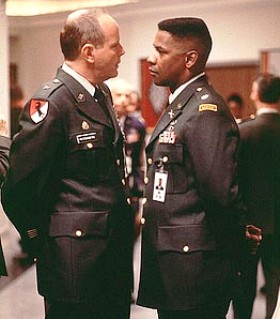The Washington Post reported (July 23) that the Government Accountability Office found that supervisors at the Pentagon pressured internal auditors “…to skew their reports on a major defense contractor’s work, hiding wrongdoing and charges of overbilling.”

Of course, whenever we hear another story detailing fraud and corruption in Washington it serves to strengthen the argument that everyone in Washington is corrupt. And that’s simply not true.
While watching the movie, “Courage Under Fire,” I was struck by a curious juxtaposition to the auditors’ story.
In the 1996 film, Denzel Washington’s character, Lt. Col. Nat Serling is charged with investigating events surrounding a heroic act during the Gulf War. On another level, the story has Serling struggling with his own integrity about his responsibility in a “friendly fire” incident in the same war, and the guilt he carries because the Army has covered up the truth about the incident to the dead soldier’s family.
The courage in the title refers to two different aspects of that quality: the physical courage taken by a field commander surrounded by enemy fire struggling to save the lives of a unit of men, and the moral courage it takes Washington’s character to stand up to the principles of his own conscience and tell the truth to the family who lost their son in combat.
I was thinking about this while I was reading how Defense auditors, “…charged with overseeing contractors… made an upfront agreement with ‘a major aerospace company’ to limit the scope of work and basis for an audit,” and thereby withheld the truth to the American public.
Another story (July 23) reported that “…former EPA deputy associate administrator Jason K. Burnett… divulged key details about how President Bush and his deputies have influenced the agency’s decisions on climate policy…”
Last month (June 24), “Investigators for the Justice Department’s Inspector General and the Office of Professional Responsibility, which oversees legal ethics, reviewed thousands of e-mail messages and conducted interviews with current and former officials, concluding that the hiring efforts ‘undermined confidence in the integrity of the department’s hiring processes.’”
In reading these stories, I kept wondering how difficult must it be, in the pressure-cooker of Washington, to do your job with integrity while avoiding undue influence and still have that job the next day?
Then I thought about the countless field commanders in Iraq and Afghanistan who, under constant pressure, make hundreds of decisions affecting the lives of thousands of combat troops every day. If those decisions are not made with absolute integrity, people could needlessly die.
At first glance “Courage Under Fire” would appear to be about the valor necessary to do the right thing under extreme circumstances. But it’s more than that. It’s about loyalty, being faithful and committed not just to family, friends and country but to a principle of conduct. It’s about duty to oneself and knowing that none of us can escape the accountability of his or her own conscience. Ultimately, it’s about being honest even when everyone else, including your commanding general, wants you to look the other way.
It’s a timely reminder for all who serve in Washington of just how critical it is to act with absolute integrity even when pressured to do otherwise
Ethics is not a partisan issue. It’s a credibility issue, and one that is vital when it comes to the trust and confidence of the American people.
In order to honor the thousands of dedicated men and women who serve our country we need to provide them with the kind of leadership the American people expect – a leadership committed to absolute integrity.
Comments










